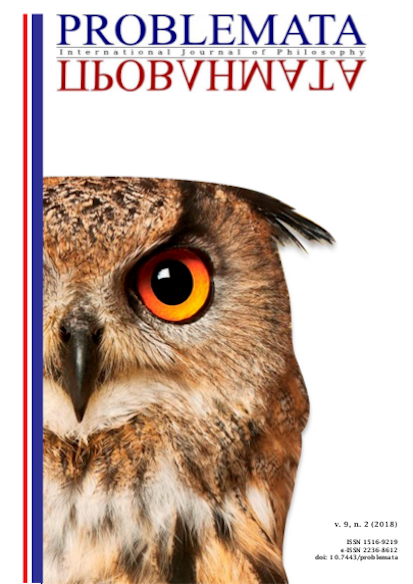WILLIAM OF OCKHAM: ABOUT THE LOGICAL ANALYSIS AND THE MONADS
DOI:
https://doi.org/10.7443/problemata.v9i2.41249Keywords:
logical analysis, semantic doctrine, monad, Occam’s razor.Abstract
This article has as its objective to show how Ockham’s logical analysis eliminates the problem despite the existence of the universals terms in the reality and brings to light his nominalist semantic doctrine. The argumentation has as scope the thesis that the work of the ontological reduction of beings puts in evidence a reality composed from monads – essential entities, simple and of singular character. The philosopher’s ontology, however, is only made explicit from the methodological principle of parsimony, that is, the non-multiplication of the beings unnecessarily – the Occam’s Razor.
Downloads
References
ASHWORTH, E. J. Linguagem e lógica. In: MCGRADE, A. S. Filosofia Medieval. Aparecida: Ideias&Letras, 2008.
BOTTIN, Francesco. La scienza secondo Guglielmo di Ockham. In: DE BONI, Luis Alberto (ORG.). A Ciência e a organização dos saberes na Idade Média. Porto Alegre: EDIPUCRS, 2000.
GILSON, Etinne. A filosofia na Idade Media. São Paulo: Martins Fontes, 1995.
HESSEN, Johannes. Teoria do conhecimento. São Paulo: Martins Fontes, 2003.
NEF, Frédéric. A linguagem: uma abordagem filosófica. Rio de Janeiro: Jorge Zahar Editor, 1995.
OKCHAM, Guillermo de. Suma de Lógica. Trad. Alfonso Flórez Flórez. Bogotá: Editora Consuelo Gaitán Gaitán, 1994.
VIER, Raimundo. A “Navalha de Ockham”. In: GARCIA, Antonio (ORG.). Estudos de Filosofia Medieval: A obra de Raimundo Vier. Petrópolis: Vozes, 1997a.
VIER, Raimundo. Ockham e os tempos modernos. In: GARCIA, Antonio (ORG.). Estudos de Filosofia Medieval: A obra de Raimundo Vier. Petrópolis: Vozes, 1997b.
Downloads
Published
Issue
Section
License
Authors who publish with this journal agree to the following terms:
- Authors retain copyright and grant the journal right of first publication with the work simultaneously licensed under a Creative Commons Attribution License that allows others to share the work with an acknowledgement of the work's authorship and initial publication in this journal.
- Authors are able to enter into separate, additional contractual arrangements for the non-exclusive distribution of the journal's published version of the work (e.g., post it to an institutional repository or publish it in a book), with an acknowledgement of its initial publication in this journal.
-
- Authors are permitted and encouraged to post their work online (e.g., in institutional repositories or on their website) prior to and during the submission process, as it can lead to productive exchanges, as well as earlier and greater citation of published work (See The Effect of Open Access).





